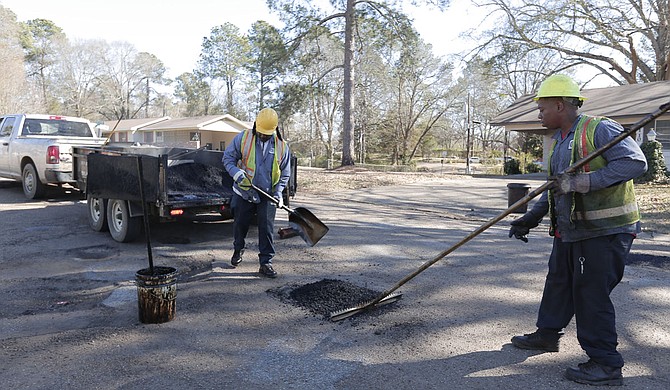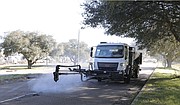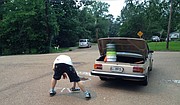The City allocated just over $2 million to streets in the recent budget, but sinkholes, utility cuts, cracks, ruts, and potholes come in every shape, size and depth imaginable. Photo by Imani Khayyam.
Chris Lewis checks his driver's side mirror before hopping down from his pickup truck. He grabs an orange and white folding barricade from the bed and sets it up 20 feet away and starts directing the vehicles zooming by to the right.
Lewis is the acting road superintendent for the city's public-works department, which includes overseeing pothole-patching operations. Brown-skinned with a short, gray beard, Lewis resembles the late "60 Minutes" journalist Ed Bradley. In place of Bradley's trademark gold hoop earring, Lewis wears a black Bluetooth device in his right ear.
His bosses at the City's Department of Public Works told Lewis not to be interviewed, he says; he's to drive a Jackson Free Press reporter and photographer to several work sites so we can observe.
On the ride over from the public-works maintenance department, we mostly ride in silence except for the soft hum of old-school gospel tunes such as the Williams Brothers' 1986 hit "Sweep Around Your Own Front Door."
Fix Potholes With Jobs
Publisher Todd Stauffer says it's time to stop talking about the streets and fix them.
In Jackson's war against potholes, Lewis would be akin to a sergeant, commanding two teams and five men total. When his Bluetooth lights up with a call from a superior, many of his answers are "yes, sir" and "no, sir." Generally speaking, the dividing line between the north and south crews is Fortification Street, itself one of the more representative symbols of pothole despair in Jackson until a major reconstruction commenced in 2012.
This cold January morning is an exception. The work order is to patch three holes off the Pearl Street exit from Interstate 55, where the road forks toward the Mississippi State Fairgrounds. On a map, it is simply called Access Road, and the City is unclear whether the state or the city is responsible for its maintenance. Heavy traffic volume flying off I-55 combined with water coming down a hill created the holes, which have elicited enough complaints to the City that public works sent one of Lewis' teams to make repairs.
Called "The Patcher," the massive truck evokes the anatomy of an insect with distinct mandible, head, thorax and abdomen-like sections. The truck, procured about six months earlier, is designed as a one-man truck, but the crew consists of two people for safety reasons. Inside the cab, a husky guy's face is behind a large clipboard, while a skinnier man wearing a backward baseball cap operates the controls.
The Patcher approaches a teardrop-shaped hole about 2 feet wide and deep enough that if it filled with water, and an adult stepped in it, water would reach her ankle. First, the pneumatic arm sends a puff of air into the pothole to clear it of debris. Next, the mechanical arm sprays a mist of emulsion—a petroleum-based tar that will harden when it cools and bind to the gravel—into the hole like spray-on adhesive.
In the next step, the arm spits out gray-colored rock chips less than a dime in a diameter and roars like a 50-foot-tall vacuum cleaner. Filling the first hole takes about 25 minutes. When it's finished, the machine again blasts the edges with air, creating a corona of rock debris around the patchwork. The crew repeats the process with a smaller fissure about 40 feet back from the first hole. Then it repeats the process again near the bottom of the road, near where it intersects with Greymont Avenue.
Satisfied with the progress of the team, Lewis climbs back into the truck. The South team is scheduled to be in the Queens neighborhood, but Lewis is told of a problem at the asphalt plant off Gallatin, so he heads over to check it out.
Dangerous and Costly
Counting potholes is like counting the members of a rebel force, close to impossible. For starters, Jackson has 1,200 miles of road, which is the same distance between Mississippi's capital and New York City, and lost more than 20,000 residents between 1990 and 2011, U.S. Census records show.
By area, Mississippi's capital city is bigger than Sacramento and Tallahassee, the government seats of California and Florida, respectively. In fact, Jackson is the 90th largest city in the United States, and bigger than the more populous cities of Seattle, Milwaukee, St. Louis and Baltimore.
Jackson's population decline, combined with a road-maintenance budget that had, until recently, not grown more than $1 million since anyone can remember, means that many of Jackson's streets have some sort of blemish. Compounding the degradation of the streets is the fact that the City is fighting two other battles, against failing water and sewer infrastructure. Moisture is to pavement what potholes are to vehicle tires and suspension components: anathema.
City officials estimate Jackson needs to raise close to $750 million for all of the capital city's infrastructure needs. When it comes to paved streets, to which the City allocated just over $2 million in the recent budget, pile on heavy traffic, and the results are a lot of sinkholes, utility cuts, cracks, ruts, and potholes that come in every shape, sizes and depth imaginable.
In recent months, city residents have seen a spate of high-profile pothole-related incidents that include a Jackson police cruiser that crashed after hitting a pothole, a night where eight or nine cars hit a pothole on Woodrow Wilson near a water leak and a TV news story about a child who fell into a water-filled "pothole"—which was actually a sinkhole created by a utility failure deep under the street. Potholes are caused by a combination of water, expanding soil and constant traffic.
To people in Jackson, who have to battle blown tires, crooked front-end alignments and nearly drowned children, the distinction between potholes, sinkholes and utility cuts are meaningless. They're dangerous and costly, and they want the city to fix them.
Duane O'Neill, president of the Greater Jackson Chamber of Commerce, said the condition of Jackson's infrastructure can affect economic development. In fact, when the chamber wants to woo businesses to the area, choosing to the least pothole-pocked route to show visitors around comes into play, he said.
"Anytime you're trying to sell someone, you have to be upfront and honest. And the honest answer is we got behind, and we have a plan to rectify that, but it's not going to happen overnight," O'Neill said.
That plan involves spending from the 1-percent local-option sales tax. Jackson voters approved the tax in early 2014, but the City only received approval from an oversight commission in spring 2015 to begin spending money; the City says a little over $13 million from the fund will be committed in the first year, from May 2015 to May 2016. City officials estimated that between $15 million to $20 million will be spent per year for a five-year period representing a total of about $90 million.
In December, the City hired Jackson-based IMS Engineers to develop a master plan for and over projects in years two through five of the sales-tax program.
City officials say the 1-percent money will not go toward quick-fix pothole patching, but will pooled with other funding sources to address some of the most visible trouble spots. Three major road renovation projects are outlined for the first year of the sales-tax: North State Street, Lynch Street and Riverside Drive. In October, the U.S. Department of Transportation awarded Jackson a $16.5 million grant for the North State Street project.
At the Feb. 9 meeting of the Jackson City Council, a Jackson State University student named Devon Curtis pressed officials during the public-comment period about the condition of City streets.
"It's because of disinvestment, and when you haven't invested in 25 (to) 30 years, this work doesn't happen because you want it to," Mayor Tony Yarber told Curtis.
But asking residents to be patient with potholes is a bit like asking the people of Flint, Mich., to have patience while government officials try to make their water safe to drink again. Elections can be won and lost because of infrastructure-related maladies, which become fodder for public mockery. In 2013, Jackson business owner Ron Chane made national news as a "pothole Robin Hood" when he stole asphalt from a Mississippi Department of Transportation depot to fill potholes around his Belhaven neighborhood.
"What motivated me was knowing the only option was to complain about it or do something about it," Chane recalls.
Chane abruptly ended his crusade after a media firestorm and political pressure from then-Mayor Chokwe Lumumba, who said through a media statement at the time that, "We do not accept any use of the city's resources without going through the proper legal channels."
Nonetheless, Chane says public-works crews eventually came along and fixed his amateur patch job. Chane, who says he recently shelled out $2,000 in front-end work on his car that he blames on the condition of City streets, says that three years since that episode, the number of potholes has increased, at least in Belhaven.
"At this point, I think it's fair to say that the pothole problem is far worse than any time in the past," he said.
Chane said he recently observed a public-works crew fix a large hole in front of a Fondren business, which drew a crowd of awestruck pedestrians. "Nobody should stand in awe because somebody is filling a pothole. That should be standard."
What's the 3-1-1?
Jackson launched 3-1-1, a public-service request hotline, in April 2011 for residents to report everything from dead animals to leaky fire hydrants to potholes.
When someone calls 311 to report a pothole, an operator enters into the system usually under the street name; that becomes what public works personnel call a work order.
Each day, the pothole crews pull up the 311 system and select work orders that can be based on a number of factors, including risk to public safety and number of complaints, said Leroy Lee, manager of the Division of Infrastructure Management under the public-works department and one of Chris Lewis' supervisors.
Lee, who has managed the division for two years, and Lewis provide direction, but where the crews work is mostly left to the discretion of the crews. Another thing that happens is that a citizen will report a pothole when it's actually a sinkhole, caused by the rupture of a water or sewer line under the street, which over time can cause the pavement to cave in.
"The community doesn't see a utility cut or a sinkhole," Lee said.
"They see a pothole."
That's why residents may see a pothole crew show up at a job site but leave because sinkholes require heavy equipment and more work that the patch crews can do.
Lee's voice is deep, and he keeps his answers succinct, referring questions about road design to engineers and eschewing questions about whether his department has adequate funding. He admits that the maintenance division has several positions that need to be filled—City officials have said that more than 100 vacancies exist in the public-works department, where some wages started at the minimum wage of $7.25 an hour until the City Council boosted the minimum in 2014—and that in the past, crews have worked hours beyond the current schedule of Monday through Friday, 7 a.m. to 4 p.m.
Asked what qualities Lee seeks in potential employees, he offers, plainly: "Hard working and dedication."
Alternate Routes
Although 3-1-1 is the City's preferred method for receiving complaints, more informal, but equally effective methods include Facebook and Twitter direct messaging elected officials, including Yarber and the city council.
City council members have no executive power so they can't pick up the phone and get a pothole fixed. But, because they're more accessible than the mayor's office, council members act as conduits for people who live in their wards.
Ward 1 Councilman Ashby Foote asks constituents to send photos of potholes, which his assistant, Lee Morris, sends along to the department of public works.
"Sometimes, they're very responsive, and we get a quick (response) and sometimes it seems like it takes a long time for them to get them fixed," Foote said, referring to potholes.
Ward 6 Councilman Tyrone Hendrix, whose south Jackson district includes Mayor Yarber's home, says his office gets a fair amount of email, and uses a Facebook group called South Jackson Connected. Enough people bend Hendrix's ear at the supermarket that his wife, Ercilla, won't let him go if they're in a hurry. Hendrix is dubious of the ability of the 3-1-1 system to address the volume of complaints that pour in about infrastructure problems, so his office enters complaints on constituents' behalf directly into 3-1-1 so that he can track them.
From there, he sends a message to the mayor's constituent-services office and a public-works manager such as Leroy Lee.
"We follow up every day until something is done. We advocate. We push. We shame at public meetings. We scream in order to get our constituents issues resolved quickly," Hendrix said.
"The most diligent resident will, of course, get the most attention. The most organized neighborhood association will get the most attention or the most organized council member (will get attention). It comes down to being an advocate for the people you represent."
In Hendrix's view, potholes are a socioeconomic issue. Coincidentally, his interview with the Jackson Free Press took place the same day the City Council met to consider a ordinance that would ban the expansion of payday loan and check-cashing stores, which charge customers fees for quick access to cash for emergencies like car repairs. Referring to the damage that a pothole can do to a car, Hendrix said: "Two hours and 50 bucks—for a lot of people, it can be life changing."
Carl Case is all too familiar with the scenario Hendrix paints. On the night of Dec. 10, Case had finished up a final exam at Millsaps College where he's studying for his master's in business administration and was headed to celebrate with friends. As he drove down Woodrow Wilson, where a water main erupted months ago and the flowing water has damaged the street, he hit a hole that blew out his tire and bent his rim.
"The way they had it set up, they were pointing you to the pothole," Case says, referring to the orange barrels that lined the street ostensibly as a safety precaution.
Thanks to the bent rim, Case couldn't get his tire off so he called his auto club. In the meantime, he also talked to a WLBT news crew along with eight or nine other motorists who also had blowouts. In all, he spent an hour outside, missed his outing with friends and, the next day, had to shell out $50 for a new tire. He may also need a new rim.
Citizens whose cars are damaged by potholes can file a claim with the City's risk-management division, which is part of the city attorney's office, not public works, and it's not very well publicized.
"I would think there would have been some kind of warning. I don't know if they knew about it or even cared," Case said.
A JFP staffer who suffered pothole damage costing $300 filed a claim about a month ago, which is still pending.
Pothole Science
Today, the stretch of Woodrow Wilson is closed to traffic. The pothole Case hit in December was caused by a water-line rupture that gushed for weeks. Because of its proximity to University of Mississippi Medical Center, City officials could not simply shut off the main.
There are a number of different kinds of potholes and several different ways to fix them, depending where you live. Dave Bergner, a retired public-works superintendent in Arizona, seems surprised that Jackson has a problem with potholes. Most of the problem spots, he said, are in northern states that experience the freeze-thaw cycle in which water freezes, causing asphalt to expand and break up. During thawing, the water erodes the pavement even further.
Jackson has its own unique geological feature—namely, the heavy soil known as Yazoo Clay that fills with moisture in the same manner as freezing water. When it dries, it contracts, causing roads and home foundations to shift. In addition, the water table in Jackson is high, meaning there's a lot of water close to the surface.
"For pavement and roadways, water is similar to (how) unprotected metal will cause rust. Water on wood causes wood rot. Water can cause a lot of damage. When it gets below subsurface, it cant escape (and) you see a lot of rutting and breaking away the pavement," Bergner said in a telephone interview.
Naturally, climate and topography also comes into play. In addition to its eternal fight against Yazoo Clay, Jackson sometimes experiences freezes, exacerbating the pothole situation. For instance, Denver is flat and gets a lot of snow. When it melts, water cannot run off fast enough, said Pat Kennedy, a engineering supervisor at Denver Street Maintenance in Colorado.
"It starts with one small hole," he said. Patching will hold up for a few days, but a better longer-term solution involves cutting a rectangle around the problem spot then filling it with the asphalt.
Other factors in fighting the war on potholes involves using the right mix of tar and asphalt based on the temperature ranges of a given surface. Kennedy said the best way to fight potholes is to engineer the roads so water drains off and doesn't create soft spots.
Other, costlier, methods include installing drainage pipes under the road surface topped with rock or gravel or elevating the roadway with a slight crown to help the water drain, which is expensive.
Another solution is to apply a tar-like crack seal every two or three years, which also helps as does resurfacing the streets on a regular basis.
The rock solution is better than asphalt, even though the City has another pothole patcher on the way that will use asphalt instead of rock chips. The older the street, the more prone to potholes they are, Kennedy said.
"It becomes a futile effort after a time," Kennedy said of patch jobs.
"It's like scraping the rust away from your car or painting over it. Likewise, not going down and correcting the problem you're just going to be repeating it over and over again."
A Lower-Tech Approach
Chris Lewis' south Jackson pothole crew is scheduled to work in the Queens neighborhood, but is stuck in line at the asphalt plant off Gallatin.
There, Jackson's truck is in a line of dump trucks that, during busy periods, can be backed up onto Gallatin.
The Dickerson & Bowen plant is one of two places to buy asphalt in the Jackson area. The other is in Flowood. Yellow-hued gravel, piled taller than Jackson City Hall, goes up a conveyer into a massive oven that resembles a large barbecue grill where it mixes with emulsion, which gives asphalt its blackness, and goes into silos.
Trucks pull up under the designated silo, and the requested amount of asphalt drops from a chute at a temperature of around 400 degrees.
Unlike the patching machine working in downtown, the south-of-Fortification crew is noticeably less high-tech. It consists of a pickup truck pulling an open trailer that carries the asphalt and tools.
Lewis trails the crew down Gallatin and west along U.S. 80 to avoid the interstate, arriving on pothole-riddled work site on Queen Anne Lane.
Younger and energetic, the crew members bounce from the truck, lower the tailgate and get to work. One of the workers, wearing a Department of Public Works uniform with a bright yellow-green mesh safety vest, manually picks several large pieces of rock out of the targeted hole. A second worker uses a push broom to clean the debris from the hole.
Once sufficiently clean, another crew member uses a regular household broom to drizzle a thin tar to outline the hole.
Then, they go to work. Steam wafting from each scoop, asphalt is shoveled in a line on the edge of the hole and inside before another worker spreads it evenly over the hole. The third worker uses a hand tamper, a tool with a long handle with a metal plate attached to the end, to flatten the still hot asphalt.
Like the three-man weave in basketball, this is pothole-filling fundamentals: sweep, spread, and tamp, all the way of the block. After 25 minutes, 14 black patches pock the block-long stretch of road; their durability hinges on the amount of precipitation and other moisture that seeps into the cracks, whether Jackson has a freeze and for how long, and how many vehicles drive other them.
Lee, the city's maintenance management, shows up and looks on.
"As you see, this isn't the first time we've been here," Lee says, pointing to faint craters in the pavement, some which can also be seen using Google Map's satellite-view.
A man driving a dark wine-colored Jaguar wearing black and red Atlanta Braves cap approaches the site and, to no one in particular, states with a twinge of anger in his voice, "I had a blowout right there" and speeds off.
As Lewis makes a U-turn to and pulls off, he drives over the newly repaired road, proving that driving over patched potholes doesn't feel that different than driving over potholes.
Comment at www.jfp.ms/potholes. Send city story tips to news@jacksonfreepress.com.
The 411 on 311
Citizens report potholes by calling 601-960-7684. Non-emergency infrastructure issues can be reported by calling 311. The City asks that residents allow 72 hours for pothole repairs.
Citizens whose vehicles are damaged by potholes can call the Division of Risk Management to file a claim at 601-960-1039.







Comments
Use the comment form below to begin a discussion about this content.